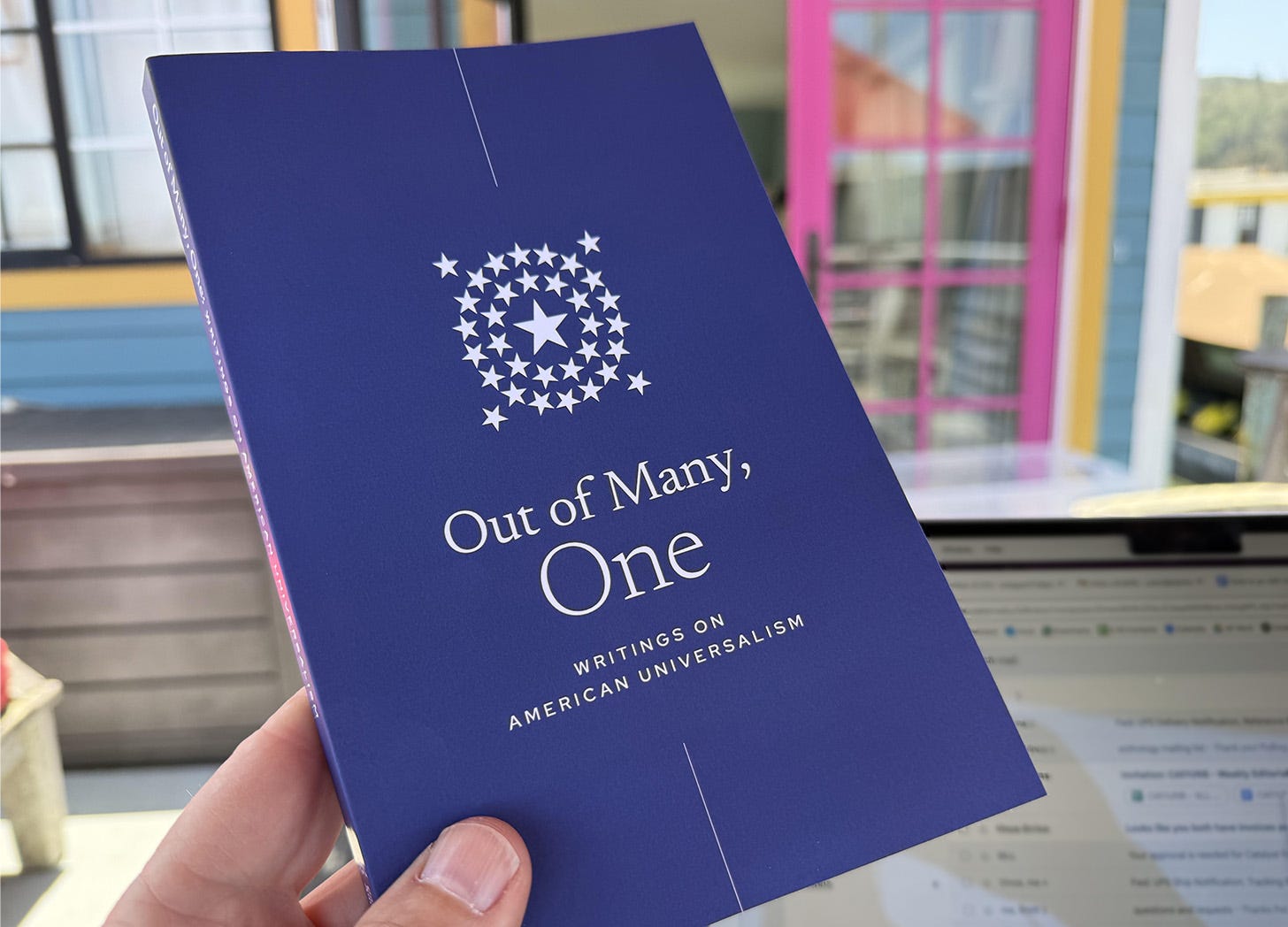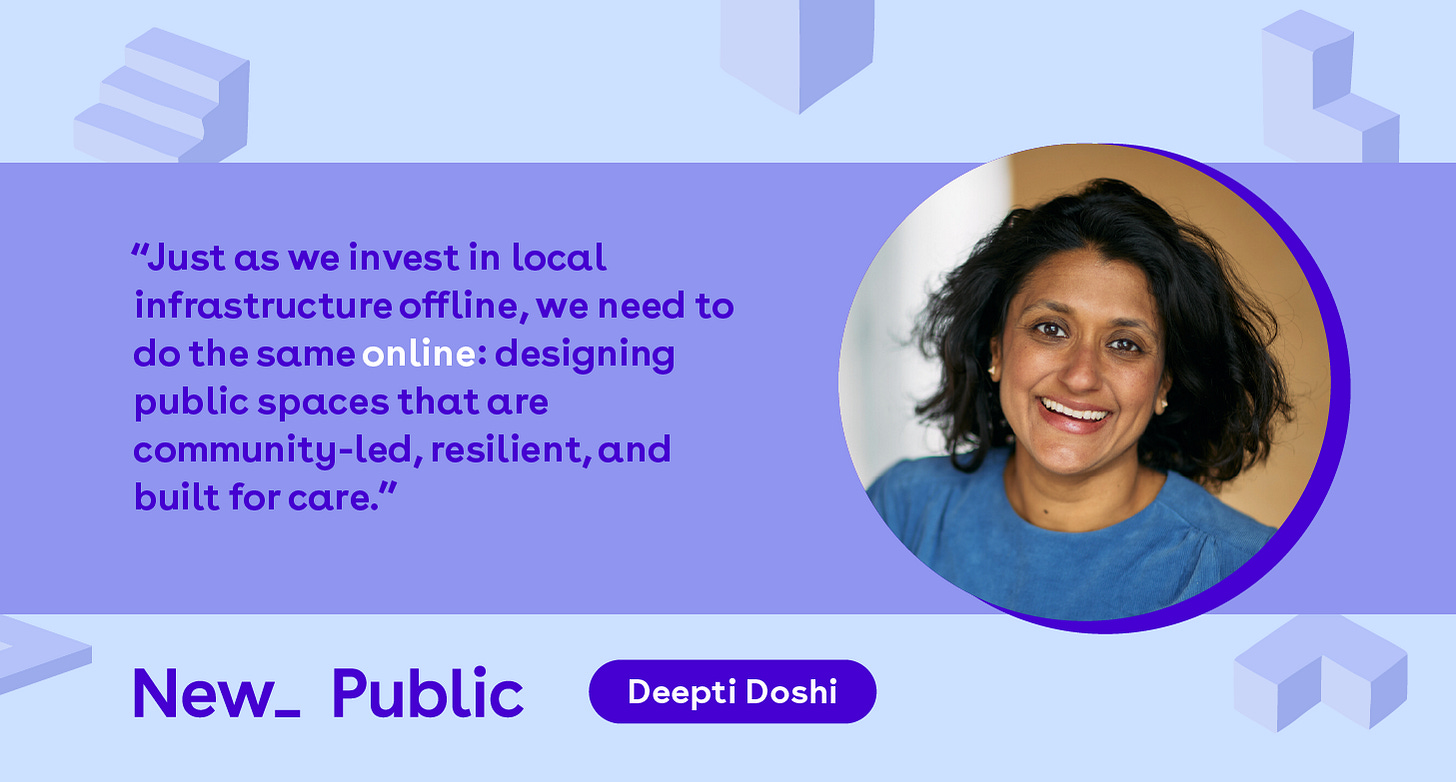🇺🇸🗽🎆 Real freedom starts with community
New_ Public Co-Director Deepti Doshi says our rights must be lived out in our neighborhoods, communities, and shared digital spaces
We are seeking a Creative Technologist & Frontend Engineer, as well as a Senior Software Engineer, for Public Spaces Incubator. Also, we are looking for a Community Engagement Associate for our Local Lab.
As we approach July 4th, we have a personal essay on American Universalism from Deepti Doshi, Co-Director of New_ Public along with Eli Pariser.
Deepti’s essay is part of a new anthology collection organized around the values of universal freedom, universal rights, and universal opportunity. Its editors aim to reclaim the mantle of unapologetic patriotism grounded in the universal values that have animated our nation’s best moments.
Deepti told me a little more about why she wanted to write this:
I really appreciated the opportunity to reflect on my own relationship to the country right now, and why I'm even here, particularly in a moment where our work is about rebuilding the social fabric and civic institutions that have always been so much of the promise of America — whether it was de Tocqueville who saw it that way, or my parents.
You can read the rest below, and sign up here to receive a download link for the whole anthology when it comes out in a few weeks. Many thanks to Friend of New_ Public Eric Steuer for his help.
–Josh Kramer, Head of Editorial, New_ Public
When I was a kid, my parents told me stories about why they'd left India. They left during The Emergency, the period in the mid-1970s when Prime Minister Indira Gandhi suspended civil liberties, imprisoned student protestors and opposition leaders, censored the press, and ruled by decree. My parents weren't revolutionaries; they were hopeful immigrants, driven not just by fear of authoritarianism but by their belief in something better for themselves and their family. They came to the United States because they believed in the radical promise of freedom — freedom not just as an abstract concept, but as a way of life.
The words of the Declaration of Independence were a promise: of inalienable rights to liberty and the pursuit of happiness. To my parents these were not just lofty ideas, but a North Star. And while I now see the contradictions those words have always contained, I still believe, as my parents did, that their promise is worth fighting for.
But freedom doesn't become real just because it's written into founding documents. It has to be experienced — in neighborhoods, schools, libraries, and local digital spaces. It's in the daily work of building trust, solving problems together, and showing up for one another that we bring life to our universal ideals. That's the work of local community. And in this moment of national division and democratic uncertainty, it may be the most important work we have.
A New Emergency Is Here
We're in a different kind of emergency now in America. Democracy is teetering under the weight of cynicism, disinformation, and division. People feel increasingly disconnected from institutions that were meant to serve them. Meanwhile, the language of change can feel inaccessible and trapped in insider conversations that don't always speak to everyday concerns. Too often, we end up with movements that are either driven by fear or too abstract to reach the people who need them most.
In the face of these forces, we need a path that reconnects the universal ideals in the Declaration to everyday life. A path rooted in shared responsibility, common purpose, and our daily lives. One that affirms that everyone deserves freedom, rights, and opportunity, and that a pluralistic society is not only possible, but necessary. That we don't have to be the same for us to be in this together.
This is where our local communities can make the difference. Universalism gives us the "what": freedom, rights, and opportunity for all. But it's in our neighborhoods, towns, and gathering spaces — both physical and digital — that we are meant to experience the "how." When communities are strong, they translate big ideals into daily life through schools and libraries, small businesses and community boards, shared kitchens and neighborhood forums. But when communities are weak, those ideals stay out of reach. A thriving democracy depends on investing in the places where universal principles can become lived experiences.
Freedom is often framed as "freedom from." Freedom from tyranny, from interference, from control. But as economist and philosopher Amartya Sen has argued, freedom is also "freedom to." Freedom to live the kind of life you value, to participate, to build, and to shape the future alongside others. That is the kind of freedom my parents were looking for. And that kind of freedom only comes through community — through trust, built over time, and with the confidence that we can solve problems together while holding space for our differences.
Community-Rooted Democracy Makes Ideals Real
Community-centered action brings freedom, rights, and opportunity to life in three fundamental ways. When we build strong local communities, we make big ideals real through daily results, shared effort, and the belief that we can shape what happens next.
Local Action Delivers Real Results in Everyday Life
Strong communities put decision-making power where people live. They invite us to create the rules, not just follow them. The freedoms in our founding documents can be a bit abstract. But when power is close at hand, freedom becomes participatory. It becomes real. Rights don't just live in courtrooms or on campaign posters. They live — or fail to live — in our schools, our shared outdoor spaces, our libraries, our streets.
Strong local communities create the conditions for rights to be experienced, not just written into law. In 2024, the Trust for Civic Life supported more than 100 rural programs across the U.S., helping local communities train leaders, create gathering spaces, and launch civic initiatives. In many cases, these efforts led to measurable gains in local engagement, with community members stepping into leadership roles for the first time.
Local structures like tenant unions, mutual aid groups, and neighborhood councils are often the first responders when broader systems fail. They're also the ones most accountable to the people they serve. To defend rights, we have to root them. That means building institutions that can withstand pressure and extend dignity, block by block — including in the digital spaces where so much of twenty-first-century life now unfolds. Just as we invest in local infrastructure offline, we need to do the same online: designing public spaces that are community-led, resilient, and built for care.
Being Together Builds Trust and Connection
Some might argue that local action alone can't address global challenges like climate change or economic inequality. They're right — but they miss how community-based work builds the relationships and habits that make broader collaboration possible. When communities practice democratic decision-making together, they develop the capacity and trust needed for coordination at every level.
We live in an age of alienation. Only 25 percent of Americans today believe that others can be trusted. Institutions are viewed with suspicion. Politics feels performative. Social media fuels outrage without offering real outlets for action. But when people work together to solve problems in the places they live, something shifts. Trust starts to grow again. The collective begins to feel possible.
Working side by side gives people a reason to show up, because they feel seen. That's how we start to reconnect democracy to identity and belonging.
Local Experience Builds Belief and Agency
Community-rooted action doesn't just make things better — it helps people see that change is possible. When you can see the impact of your voice, your vote, or your effort, democracy starts to feel like something real. This is how agency takes root.
When people help shape their communities — and see the fruits of that participation — they begin to believe in democracy again. They begin to believe in one another. From town-wide initiatives in Libby, Montana, to neighborhood efforts in the Imperial Valley, the Trust found that even small wins like public events or beautification projects can restore people's sense that things don't happen to them but because of them.
Local Digital Spaces Can (And Must) Support This Work
The same spirit that powers a neighborhood garden or community center can thrive online, if we design for it. As Robert Putnam documented 25 years ago in Bowling Alone, many of the social institutions that once formed the bedrock of American civic life, such as PTAs, faith groups, and neighborhood associations, have eroded over time. In their absence, people have turned to digital spaces for connection and shared purpose — especially local digital spaces where neighbors gather online to share news, organize efforts, and solve problems close to home.
At New_ Public, where I am a co-director, we're reimagining local digital spaces as essential civic infrastructure. These are the places where people now gather online to organize mutual aid, swap advice, share hyperlocal news, and hash out their neighborhood's future. But today, most of these digital gathering places are shaped by commercial platforms whose algorithms reward outrage over dialogue.
That's why we work closely with the community stewards who manage these spaces. These volunteer moderators and organizers do the invisible work of holding communities together. But the platforms they operate within often make that work harder, not easier. Their success depends not just on goodwill, but on support: training, tools, and thoughtful design that aligns with civic goals, not just ad revenue.
We've seen what's possible when these stewards are empowered. Through projects like our Neighborhood Steward Fellowship, we've brought together leaders of local online spaces from across the country to share practices, build networks, and imagine new models. The results are inspiring. But if we want this kind of locally focused digital infrastructure to thrive, we need structural change — including new incentives, new tools, and ownership models that prioritize the public good.
Freedom Is Something We Practice Together
American Universalism has always been a radical idea: that freedom belongs to everyone, that rights are universal, that opportunity is a guarantee. But these ideals aren't self-executing. They have to be built, block by block, thread by thread.
We can't meet this moment with fear or fatalism. We have to meet it with commitment. With presence. With courage. And with our neighbors.
As one of my favorite Buddhist teachers, Thich Nhat Hanh, reminds us, "We are here to awaken from our illusion of separateness." Freedom isn't something we fight for alone. It's something we practice together: in town halls and neighborhood meetings, in mutual aid networks and cooperatives, and in digital spaces designed for connection rather than extraction. The future of democracy depends not just on whom we elect, but on how deeply we are engaged with and can participate in the places we call home.
–Deepti Doshi, Co-Director, New_ Public
Thanks Deepti!
Going to be casual about fireworks this year,
–Josh





